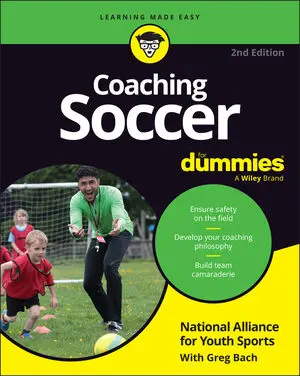This builtin is not currently supported: Animation
- Book & Article Categories

- Collections

- Custom Solutions
 Main Menu
Main MenuBook & Article Categories
 Main Menu
Main MenuBook & Article Categories
Greg Bach
Greg Bach is the Director of Communications for the Alliance.
Articles & Books From Greg Bach
Become an unforgettable soccer coach for kids of any age, with this complete guide Coaching Soccer For Dummies is a quick and easy reference guide for anyone who wants to start coaching youth soccer—or start coaching better. Help kids 5 and older to improve their skills, work together, and have fun, no matter their experience level.
Article / Updated 09-15-2023
A ball hog — a player who hangs on to the ball for extended periods of time and always looks to shoot rather than pass — creates real problems for the entire team. For instance, a ball hog ignores open teammates who have worked to get into position to score, which undermines team morale and kills your sense of unity.
Article / Updated 09-15-2023
As a youth basketball coach, teaching kids the importance of good sportsmanship can be challenging. What makes teaching (and modeling) good sportsmanship particularly tricky is that youngsters are bombarded with images of older basketball players trash talking, showboating, and disrespecting opponents and officials.
Article / Updated 09-15-2023
Playing basketball requires a broad range of skills. As a coach, being able to assess a youngster's strengths and weaknesses is crucial for determining where they best fit in your lineup.
Your early practices should offer a peek at a player's ability in specific areas. Scrimmages or games involving just a handful of players and drills are ideal ways to gain a real sense of a child's strengths and weaknesses in certain basketball skills.
Cheat Sheet / Updated 02-25-2022
Coaching soccer should be safe and fun for you and your players, so start by getting familiar with the layout of the soccer field. As a soccer coach your players will look to you for guidance so use some helpful tips to teach and motivate them. Create a pregame routine to check the field and prepare your soccer players for the game and deliver a strong pregame speech to inspire your team.
Cheat Sheet / Updated 02-22-2022
Being a basketball coach involves always being prepared for practice and running a practice that’s fun and productive. An effective coach keeps players motivated and builds both individual and team confidence. Know what to say and how to say it before, during, and after a basketball game to impact the performance and morale of your players.
Article / Updated 03-26-2016
A child's experience in organized soccer can be a defining moment in her young life. Years from now, she isn't going to remember her team's record or how many goals she scored during the season, but she'll easily recall whether the time the team spent with you was a positive or negative experience. This article provides some methods you can use to ensure that your players have a memorable season that brings a smile to their faces for years to come and has them begging to play for you again next season.
Article / Updated 03-26-2016
Youth soccer leagues around the country are as different as the millions of kids who strap on shin guards to play in them. You can find outdoor and indoor leagues. Numbers go from 4-on-4 to 11-on-11 leagues. Ages fluctuate from 5-and-under leagues to 17-and-under leagues. You even have the option of same-sex leagues or coed leagues.
Article / Updated 03-26-2016
Being a parent is a difficult job, but here's a surprise: Coaching your son or daughter's soccer team is equally tricky. After you step inside the white lines, and your child straps on the shin guards, you're likely to encounter an assortment of issues. Most of them should be minor, but some may be problems that you never even dreamed of dealing with before.
Article / Updated 03-26-2016
Creating a coaching philosophy is fairly simple. Living up to it all season long is the tricky part. What's a coaching philosophy? Basically, it reflects the standards you set for yourself and your team, and it's the foundation of your coaching values and beliefs.
Entering the season without a coaching philosophy is like driving across the country without a road map.




